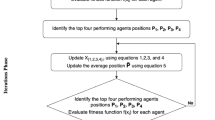Abstract
Many engineering optimization problems frequently encounter continuous variables and discrete variables which adds considerably to the solution complexity. Very few of the existing methods can yield a globally optimal solution when the objective functions are non-convex and non-differentiable. This paper presents a hybrid swarm intelligence approach (HSIA) for solving these nonlinear optimization problems which contain integer, discrete, zero-one and continuous variables. HSIA provides an improvement in global search reliability in a mixed-variable space and converges steadily to a good solution. An approach to handle various kinds of variables and constraints is discussed. Comparison testing of several examples of mixed-variable optimization problems in the literature showed that the proposed approach is superior to current methods for finding the best solution, in terms of both solution quality and algorithm robustness.
Similar content being viewed by others
References
Bonabeau, E., Dorigo, M., Theraulaz, G., 1999. Swarm Intelligence: from Natural to Artificial Systems. Oxford University Press.
Cao, Y.J., Wu, Q.H., 1997. Mechanical Design Optimization by Mixed-variable Evolutionary Programming. Proceedings of the 1997 IEEE Conference on Evoluionary Computation, IEEE Press, p.443–446.
Cao, Y.J., Jiang, L., Wu, Q.H., 2000. An evolutionary programming approach to mixed-variable optimization problems.International Journal of Applied Mathematical Modelling,24(10):931–942.
Cha, J., Mayne, R., 1989. Optimization with discrete variables via recursive quadratic programming: part II.Transaction of the ASME,111:130–136.
Chen, J.L., Tsao, Y.C., 1993. Optimal design of machine elements using genetic algorithms.Journal of the Chinese Society of Mechanical Engineers,14:193–199.
Coit, D.W., Smith, A.E., Tate, D.M., 1996. Adaptive penalty methods for genetic optimization of constrained combinatorial problems.INFORMS J. Computing,8: 173–182.
Dorigo, M., Maniezzo, V., Colorni, A., 1996. The ant system: optimization by a colony of cooperating agents.IEEE Transactions on Systems, Man, and Cybernetics, Part B,26:29–41.
Fu, J.F., Fenton, R.G., Cleghorn, W.L., 1991. A mixed ineger-discrete-continuous programming method and its application to engineering design optimization.Engineering Optimization,17:263–280.
Hajela, P., Shih, C., 1989. Multiobjective optimum design in mixed-integer and discrete design variable problems.AIAA Journal,28:670–675.
Kennedy, J., Eberhart, R., 1995. Particle Swarm Optimization. Proceedings of IEEE International Conference on Neural Networks, p.1942–1948.
Kennedy, J., Eberhart, R., Shi, Y., 2001, Swarm Intelligence, Morgan Kaufmann Publishers, San Francisco.
Li, H.L., Chou, C.T., 1994. A global approach of nonlinear mixed discrete programming in design optimization.Engineering Optimization,22:109–122.
Lin, S.S., Zhang, C., Wang, H.P., 1995. On mixed-discrete nonlinear optimization problems: A comparative study.Engineering Optimization,23:287–300.
Loh, H.T., Papalambros, P.Y., 1991a. A sequential linearization approach for solving mixed-discrete nonlinear design optimization problems.ASME Journal of Mechanical Design,113:325–334.
Loh, H.T., Papalambros, P.Y., 1991b. Computational implementations and tests of a sequential linearization algorithm for mixed-discrete nonlinear design optimization problems.ASME Journal of Mechanical Design,113:335–345.
Sandgren, E., 1990. Nonlinear integer and discrete programming in mechanical design optimization.ASME Journal of Mechanical Design,112:223–229.
Thierauf, G., Cai, J., 1997. Evolution Strategies-parallelization ad Application in Engineering Optimization.In: B.H.V. Topping (ed.), Parallel and Distributed Processing for Computational Mechanics. SaxeCoburg Publications, Edinburgh.
Wang, H.F., Li, H., Chen, H., 2002. Power system voltage control by multiple STATCOMs based on learning humoral immune response.IEEE Proc. Part C,149: 301–305.
Wu, S.J., Chow, P.T., 1995. Genetic algorithms for nonlinear mixed discrete-integer optimization problems via meta-genetic parameter optimization.Engineering Optimization,24:137–159.
Zhang, C., Wang, H.P., 1993. Mixed-discrete nonlinear optimization with simulated annealing.Engineering Optimization,21:277–291.
Author information
Authors and Affiliations
Additional information
Project supported by the National Natural Science Foundation of China (Nos. 60074040, 6022506) and the Teaching and Research Award Program for Outstanding Young Teachers in Higher Education Institutions of China
Rights and permissions
About this article
Cite this article
Guo, Cx., Hu, Js., Ye, B. et al. Swarm intelligence for mixed-variable design optimization. J. Zhejiang Univ. Sci. A 5, 851–860 (2004). https://doi.org/10.1631/jzus.2004.0851
Received:
Revised:
Published:
Issue Date:
DOI: https://doi.org/10.1631/jzus.2004.0851




